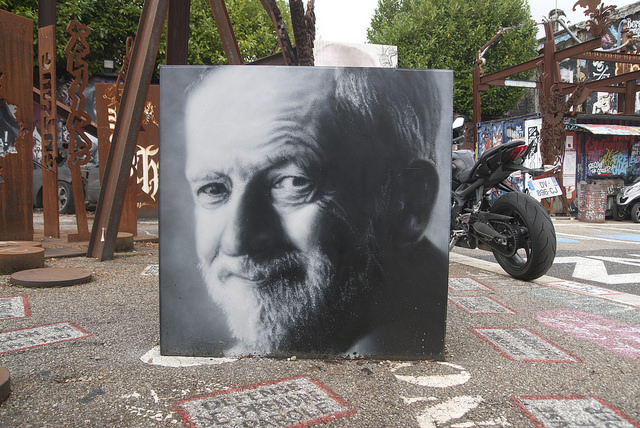Contemporary politics requires the simultaneous having and eating of cakes, as Jeremy Corbyn is finding out over Europe
The UK will hold a referendum on the country’s membership of the European Union at some point over the next 12 months or so. Henrik Bang argues that the forthcoming referendum has shone a light on the nature of contemporary politics, particularly in terms of the changing nature of the Labour Party – now led by the eurosceptic Jeremy Corbyn.

Credit: theirry ehrmann, CC BY 2.0
Big politics is increasingly a matter of having one’s cake and eating it: we want open borders for trade and closed borders for refugees and migrants; state protection of national carbon energy and work places and governance across borders for handling, or at least easing, our problems with global warming and economic crises tendencies (to mention but two obvious examples). What it all boils down to is an issue about how simultaneously to be ideological and practical, connecting concerns for latent and suppressed conflicts with worries over unattended and concealed risks. Politics today must be as double edged as politics-policy and policy-politics – a slightly clumsy but nevertheless illustrative term for assessing whether a policy dilemma primarily calls for the politicisation or problematisation of how things are politically decided and executed.
Politics-policy places concerns about problematisation in the shadow of politicisation where the focus is on ideological conflicts and how they are resolved. The underlying question is ‘how can citizens acquire free and equal access to, and recognition in, the political decision-making process?’ In policy-politics it is the other way around. The politicization issues raised by ‘We, the People’ recede into the background, because the focus is on how to govern the concrete risks that confront the population in their everyday life. The basic issue is how best to articulate, perform, deliver and audit policies that can improve our welfare and wellbeing.
Representative government has, from the outset, been organised and institutionalised as politics-policy. It is about groups and classes with common interests who organize in parties to win elections and run government. Accelerating complexity and risk, most of all due to growing globalisation, personalisation, and digitalisation, are relentlessly pushing old ‘input’ democracy towards reorganising itself in order better to handle the multiple, transnational challenges of policy-politics on the output side. But, big politics front stage, remains grounded in hard and decisive government aimed at protecting and serving the national interest as well as ‘the people’s life, liberty and estate’.
Conventional politics-policy blocks the introduction of softer and smarter governance able to cope with the cross-boundary existential risks that confront the population. A good example is that no political commentators and experts saw Jeremy Corbyn coming, and when he did arrive, they nearly all deemed him a failure that would drag Labour down. Tony Blair calls his rise to leadership a “tragedy”, reckoning it to be “in danger of not asking the right questions, never mind failing to get the right answers”. However, I think there is more novelty to Corbyn’s NEW, New/Old Labour than there ever was to Blair’s copycat version of neoliberalism. This is noticeable in Corbyn’s first speech to the Labour Party, emphasizing how Labour shall be:
“Kinder, more inclusive. Bottom up, not top down.
In every community and workplace, not just at Westminster.
Real debate, not message discipline
Straight talking. Honest.
That’s the politics we’re going to have in the future in this party and in this movement.
And it was a vote for political change in our party as well.”
Those schooled in old politics-policy will shake their heads over the ‘naivety’ of Corbyn’s call for more soft and smart governance. But, his introduction of the new policy-politics dimension into representative democracy does appeal to the voters. As he stresses: “More than 160,000 have joined the Labour party. And more than 50,000 have joined since the declaration of the leadership and deputy leadership election results.”
The question is whether Corbyn can keep the tension between old politics-policy and new policy-politics at bay and perhaps even be one of the first in big politics to try to remedy it. As Christina Watkins, constituency secretary for Southampton and Romsey, points out: “We’ve had a lot of older members coming back who think meetings and local politics should be conducted in the same way as it was in the 70s and 80s, [and who] want to meet in a town hall and sit around calling each other ‘comrade’ and ‘Mr Chairman’.” But, as she also stresses, an even bigger number of new school participants for whom social media are the new town hall are joining Labour too. They are in no way like the radical leftists from the 70s and 80s, and their message to the leadership is, as a young Corbyn supporter puts it: “Please don’t patronise me”.
Unlike the old guard, the new young members don’t want a leader who demands obedience, requires them to form a thick collective identity, or march in line to for acquire hegemony. They precisely crave for a leader who is more soft and smart than hard and decisive. Yet, Corbyn shall show courage to tell voters the truth exactly as it is, and in face of all danger, sarcasm and forbearance. The young members see Corbyn as giving them the chance “to reshape the left of British politics, as Labour looks to reshape itself” They prefer to do politics concretely and together rather than indulge in ideology and social tea parties. As Christina Watkins warns Corbyn: “At some point there is going to be a collision between these older and younger people: those that see this as a return to the old politics and those who see it as a new kind of politics.”
Corbyn’s first big test is to convince voters that, in order to handle the high consequence risks that threaten the population, Britain must stay in the EU. Brits, like many other people in the EU, blame the EU for not doing enough to ‘deal with’ asylum seekers, youth unemployment, rising inequality and environmental decay. But, they are less prone to ask themselves whether it is not their own nationalism and consumerism that upset the EU-apple cart. As Corbyn states:
“Labour will be campaigning in the referendum for the UK to stay in the European Union….We will make the case that membership of the European Union helps Britain to create jobs, secure growth, encourage investment and tackle the issues that cross borders – like climate change, terrorism, tax havens and the current refugee crisis.”
Corbyn realises how too much commitment to the national interest combined with a too thick sense of national community (politics-policy) can stall all attempts at making use of the EU to develop a more connective form of governance. Connective governance must be anchored in the self-governance exercised in and by a common action community which is not as thick as the national one, since it requires our reciprocal acceptance and recognition of our differences. I wish him well as captain on his new ship and send him all my best wishes for his dangerous journey through the waves of politicisation and problematisation.
—
It represents the views of the author, and not those of Democratic Audit or the LSE. Please read our comments policy before posting.
—
 Henrik Bang is Professor of Governance at the Institute for Governance and Policy Analysis, the University of Canberra, and Associate Professor at the Department of Political Science, the University of Copenhagen.
Henrik Bang is Professor of Governance at the Institute for Governance and Policy Analysis, the University of Canberra, and Associate Professor at the Department of Political Science, the University of Copenhagen.





 Democratic Audit's core funding is provided by the Joseph Rowntree Charitable Trust. Additional funding is provided by the London School of Economics.
Democratic Audit's core funding is provided by the Joseph Rowntree Charitable Trust. Additional funding is provided by the London School of Economics.
[…] This article was originally published at our sister site Democratic Audit. It gives the views of the author, and not the position of EUROPP – European Politics and […]
Contemporary politics requires the simultaneous having & eating of cakes, as Corbyn is finding out over Europe https://t.co/k8WYpnkyY6
Contemporary politics requires the simultaneous having and eating of cakes, as Corbyn is finding out over Europe https://t.co/OkhNDtX3QD
Contemporary politics requires simultaneously having & eating of cakes, as Jeremy Corbyn is finding out over Europe https://t.co/YwOnEern6q
Contemporary politics requires the simultaneous having and eating of cakes, as Jeremy… https://t.co/Uf2Rj9fq9x https://t.co/hvAdBttTHw